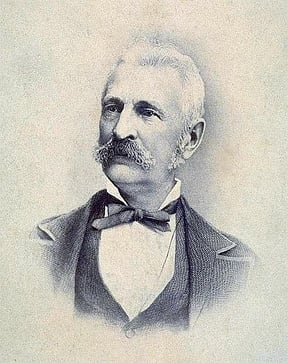Six years ago, people all of a sudden became interested in the language spoken by Jesus. The occasion for this burst of curiosity was the release of Mel Gibson’s film, The Passion of the Christ. Although responses to this movie varied widely, just about every viewer was struck by the fact that not one word of English was spoken in the film. All dialogue was in one of two ancient languages: Aramaic or Latin. Without the English subtitles, most of us wouldn’t have been able to understand a word in The Passion of the Christ. (Photo: A statue of Jesus in his passion, from a church on the Mediterranean island of Menorca.)
 Many who saw this movie wondered about its antique languages. What is Aramaic, anyway? Was this really the language spoken by Jesus? Didn’t he speak Hebrew, the primary language of the Hebrew Scriptures? And, since the New Testament Gospels are preserved in Greek manuscripts, is it possible that Jesus also spoke Greek?
Many who saw this movie wondered about its antique languages. What is Aramaic, anyway? Was this really the language spoken by Jesus? Didn’t he speak Hebrew, the primary language of the Hebrew Scriptures? And, since the New Testament Gospels are preserved in Greek manuscripts, is it possible that Jesus also spoke Greek?
In February 2004, the month when The Passion of the Christ was released, I wrote a short blog series on the language(s) of Jesus. Drawing from my background in New Testament studies, I tried to explain in non-technical terms the issues associated with the language or languages spoken by Jesus. My answer to the question “What language(s) did Jesus speak?” was representative of what most scholars of the New Testament believe, and was based on key passages from the New Testament itself, as well as an understanding of life in Judea during the first century A.D. In a nutshell, I showed that it’s most likely that Jesus spoke Aramaic as his primary language, and that he almost certainly knew Hebrew and perhaps Greek as well. It was unlikely, I argued, that Jesus spoke Latin, as envisioned in The Passion of the Christ.
During the past six years, thousands of people have visited my series on the language(s) of Jesus, thanks to the power of Google and similar search engines. The vast majority of readers did not contact me, which is just fine. They had no particular reason to do so. A few dozen people emailed me to thank me for what I had written.
And then there were the others, those who were not happy with me and what I had written. Sometimes they wrote nasty notes, criticizing my scholarship and even my Christian character. Sometimes they wrote extensive treatises, arguing at length for a position different from the one I had taken in my series. Among those who wrote, a few referred to credible scholars who have argued that Hebrew and/or Greek were commonly used by Jews in Judea during the time of Jesus. Some who contacted me seemed to believe that because the Old Testament was written in Hebrew, Jesus must have spoken Hebrew, otherwise somehow his mission as the Messiah would have been deficient. Some were worried that if Jesus spoke Aramaic, this would contradict passages in the Gospel of John that refer to Hebrew being spoken (though not by Jesus, actually).
In the last couple of years, I have run into a new reason why some people dispute the notion that Jesus spoke Aramaic. It has to do with the passion among some Muslims for an Aramaic-speaking Jesus. Presumably, and I have not followed these arguments carefully, certain Muslims use the idea that Jesus spoke Aramaic as a support for the truth of Islam. In response, some Christians have taken up arms in favor of the Hebrew-speaking Jesus. Those who fight this battle have accused me of giving aid and comfort to the enemies of Christianity by suggesting that Jesus probably spoke Aramaic. (Note: If you are aware of other reasons why the language(s) of Jesus matter so much to some people, please let me know by leaving a comment below.)
I must admit that I was stunned by the extent to which some people get worked up about the language(s) of Jesus. As one who believes about Jesus all the things orthodox Christians do, it would not impact my faith one jot or tittle if Jesus spoke Hebrew rather than Aramaic, or Greek rather than Hebrew. Thus I am not caught up in the emotional maelstrom of this language of Jesus debate.
But I do think the language of Jesus matters. Knowing which language or languages Jesus spoke helps us understand his teaching with greater accuracy. Moreover, it reminds us of one salient fact that almost everyone affirms: Jesus did not speak English. (Okay, I’ve had a couple of people object to this on the grounds that Jesus was God, and that God knows everything, so therefore Jesus knew how to speak English. Apart from the theological problems with this view, it is surely true that Jesus did not actually speak English, no matter whether or not he had a miraculous ability to do so. Nobody in the first-century A.D. spoke English, least of all those who lived in Judea. So we can be sure that Jesus, Son of God and all, did not speak English.)
The fact that Jesus did not speak English serves as a reminder to those of us who do that we need to work hard if we wish to understand the original meaning of Jesus’ teachings. Now, you don’t have to spend the next several years learning ancient languages because English translations of the biblical text are quite reliable. Moreover, there are plenty of commentaries and teachers who can bridge the gaps in your linguistic understanding. In fact, careful study of the English text of the Bible will allow you to discern Jesus’ true meaning in most instances, even if you don’t know the language(s) he spoke. But this careful study requires time and effort. And it requires acknowledging the gap between Jesus’ culture and our own. Many common misunderstandings of Jesus stem from the projection of English meanings and American culture onto Jesus’ words and ways.
In the next few posts, I will offer a revised and improved (I hope!) version of my original series on the language of Jesus. I hope to show why most historians believe that Jesus spoke Aramaic, as well as to consider the possibility that he also spoke Hebrew and/or Greek and/or Latin. When I finish with my historical survey, I’ll offer some further reasons why it matters to us what language(s) Jesus spoke.

